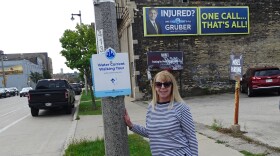A new report shows 71.5% of Wisconsin children on Medicaid did not see a dentist in 2011.
Experts point to too few dentists operating in the inner-city and rural areas and who accept new Medicaid patients as main causes for the crisis.
A dentist on Milwaukee's northwest side, Dr. Monica Hebl says the report squares with her experience.
"Access to care for underserved poor children is difficult," she says. "I was surprised that we were as low on the list as we were, but we are the fifth lowest in Medicaid reimbursement rates across the country."
She says her office is inundated with calls from patients on Medicaid looking for appointments. Hebl says that just shows the crisis levels of underserved, low-income dental patients in the state.
But because reimbursement rates haven't kept up with the economy, Hebl says many dentists moved out of the central city areas with a high-concentration of Medicaid patients.
"With reimbursement rates at 35 cents on the dollar and overhead running 60-65 cents - and that doesn't even include the dentist's salary in that - it's difficult," she says. "That's why it's not something that you can have an entire practice that's Medicaid or, your bottom line, you wouldn't be able to pay your bills."
Though the report focuses on children, Hebl says low-income adults also have major problems getting access to dental care - and that could cause bigger problems.
"People don't seem to place a high priority on oral health care, I think, because they don't understand that your overall health depends on your oral health so much," she says.
For example, a cavity that left untreated could turn into an infection - and a medical emergency. It could not only swell one's airway shut but go to the brain. She says this is what happened in the case of a 12-year-old Maryland boy named Diamonte Driver, who died of untreated dental disease.
But beyond an extreme case like that, Hebl says diabetic patients also need a dental home to help control gum disease exacerbated by their diabetes. Moreover, some studies have shown links to heart disease and low birth weights due to poor oral health.
Hebl is also chair of the American Dental Association's Council on Access, Prevention, and Interprofessional Relations, and is a former president of the Wisconsin Dental Association. In both capacities, she works to get the word out about these issues.
"It's just underserved kids that have the majority of the disease, and we can do something about that -that's what kind of frustrating from my perspective," she says. "This is a solvable problem - it's a tough problem, but it's definitely solvable."





